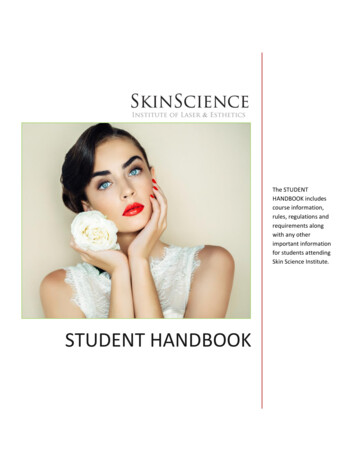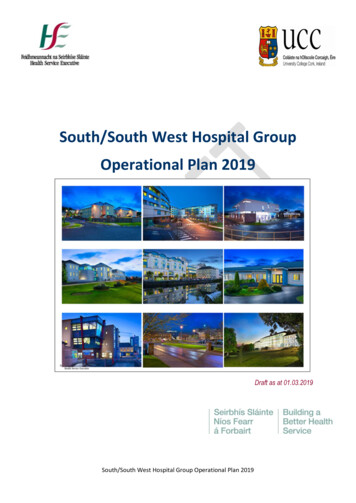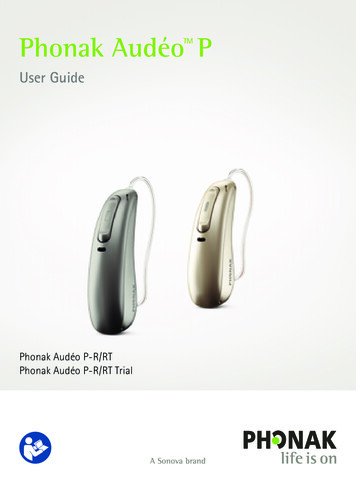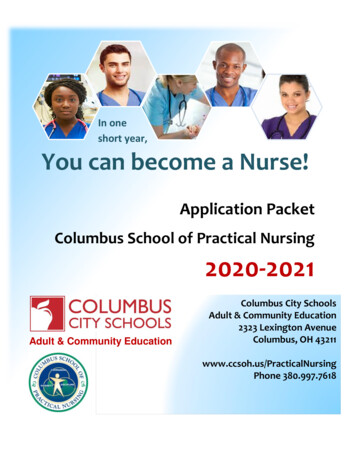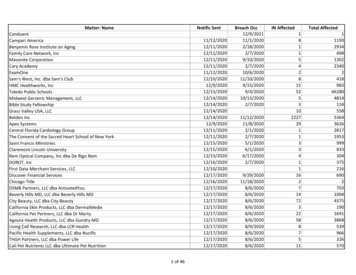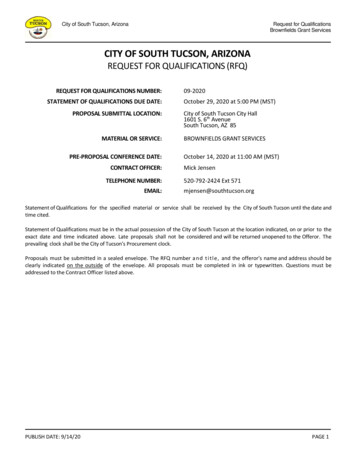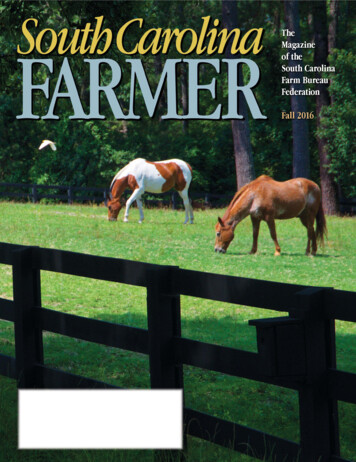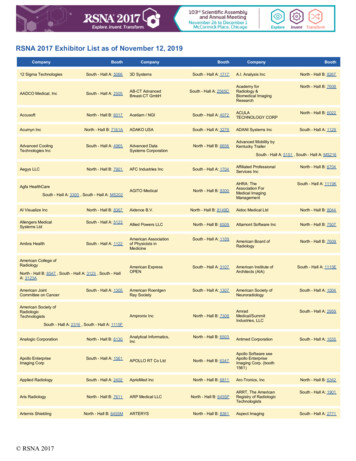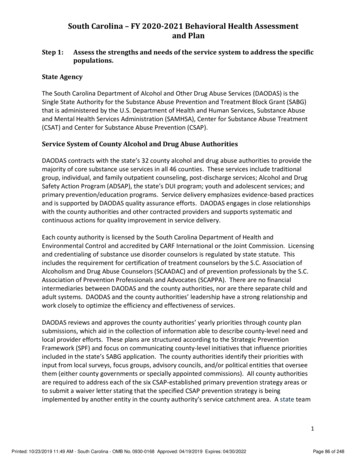
Transcription
South Carolina – FY 2020-2021 Behavioral Health Assessmentand PlanStep 1:Assess the strengths and needs of the service system to address the specificpopulations.State AgencyThe South Carolina Department of Alcohol and Other Drug Abuse Services (DAODAS) is theSingle State Authority for the Substance Abuse Prevention and Treatment Block Grant (SABG)that is administered by the U.S. Department of Health and Human Services, Substance Abuseand Mental Health Services Administration (SAMHSA), Center for Substance Abuse Treatment(CSAT) and Center for Substance Abuse Prevention (CSAP).Service System of County Alcohol and Drug Abuse AuthoritiesDAODAS contracts with the state’s 32 county alcohol and drug abuse authorities to provide themajority of core substance use services in all 46 counties. These services include traditionalgroup, individual, and family outpatient counseling, post-discharge services; Alcohol and DrugSafety Action Program (ADSAP), the state’s DUI program; youth and adolescent services; andprimary prevention/education programs. Service delivery emphasizes evidence-based practicesand is supported by DAODAS quality assurance efforts. DAODAS engages in close relationshipswith the county authorities and other contracted providers and supports systematic andcontinuous actions for quality improvement in service delivery.Each county authority is licensed by the South Carolina Department of Health andEnvironmental Control and accredited by CARF International or the Joint Commission. Licensingand credentialing of substance use disorder counselors is regulated by state statute. Thisincludes the requirement for certification of treatment counselors by the S.C. Association ofAlcoholism and Drug Abuse Counselors (SCAADAC) and of prevention professionals by the S.C.Association of Prevention Professionals and Advocates (SCAPPA). There are no financialintermediaries between DAODAS and the county authorities, nor are there separate child andadult systems. DAODAS and the county authorities’ leadership have a strong relationship andwork closely to optimize the efficiency and effectiveness of services.DAODAS reviews and approves the county authorities’ yearly priorities through county plansubmissions, which aid in the collection of information able to describe county-level need andlocal provider efforts. These plans are structured according to the Strategic PreventionFramework (SPF) and focus on communicating county-level initiatives that influence prioritiesincluded in the state’s SABG application. The county authorities identify their priorities withinput from local surveys, focus groups, advisory councils, and/or political entities that overseethem (either county governments or specially appointed commissions). All county authoritiesare required to address each of the six CSAP-established primary prevention strategy areas orto submit a waiver letter stating that the specified CSAP prevention strategy is beingimplemented by another entity in the county authority’s service catchment area. A state team1Printed: 10/23/2019 11:4911:48 AM - South Carolina - OMB No. 0930-0168 Approved: 04/19/2019 Expires: 04/30/2022Page 8665 of 248102
South Carolina – FY 2020-2021 Behavioral Health Assessmentand Planreviews the plans for identification of statewide priorities. Approval is granted by the DAODASDirector.Primary PreventionPrimary prevention is a priority for South Carolina and DAODAS, as demonstrated by thecomprehensive nature of the state’s prevention infrastructure and the diverse funding streamsfor prevention, including both state and federal funding. DAODAS will continue to spend aminimum of 20% set aside from the SABG to ensure that alcohol, tobacco, and other drug(ATOD) primary prevention services are available throughout the state’s 46 counties. DAODASalso receives a small amount of general State revenue that is earmarked for prevention andutilized by the local providers for general primary prevention services.Each county agency submits a county plan at the beginning of the state fiscal year to DAODASfor approval. The county plan encapsulates the SPF approach and primary prevention services– as indicated by local needs assessment – are included in the county plans. To assist the Statein fulfilling federal expectations and mandates, counties demonstrate, by utilizing the SPF, howprimary prevention service activities that are outcome focused fall under each of the sixstrategies designated by CSAP – Information Dissemination, Education, Alternatives, ProblemIdentification and Referral, Community-Based Process, and Environmental.During FY2010, Regional Capacity Coaches were added to the South Carolina preventioninfrastructure to provide training and technical assistance to SPF State Incentive Grant (SPF SIG)sub-recipients. The coaches’ role has expanded over the years to include providing preventiontrainings and technical assistance through the SABG primary prevention set aside to all 32county alcohol and drug abuse authorities. Coaches are expected to provide guidance, training,and technical assistance for SABG and discretionary grant-related staff, programs, practices,and services. As related to capacity of prevention professionals in particular, each RegionalCapacity Coach is available to help strengthen the workforce’s capacity to use the SPF on acontinuous basis. Areas of technical assistance and training may include, but are not limited to:1) SPF; 2) Planning and Evaluation; 3) Prevention Education and Service Delivery; 4)Communication; 5) Community Organization; 6) Public Policy and Environmental Change; and 7)Professional Growth and Responsibility. Each Regional Capacity Coach also meets needs asidentified by DAODAS or the counties served within his/her region by increasing the capacity ofother local staff (e.g., agency directors) to utilize the SPF.TreatmentThe 32 county alcohol and drug abuse authorities provide the following core services in each ofthe 46 counties: traditional group, individual, and family outpatient counseling, to include thepost-discharge period; Alcohol and Drug Safety Action Program (ADSAP) (described in moredetail below), which is the state’s DUI program; youth and adolescent services; primaryprevention/education programs; and gambling addiction services.Many county authorities provide specialized levels of care, such as intensive outpatient services2Printed: 10/23/2019 11:4911:48 AM - South Carolina - OMB No. 0930-0168 Approved: 04/19/2019 Expires: 04/30/2022Page 8766 of 248102
South Carolina – FY 2020-2021 Behavioral Health Assessmentand Plan(nine or more hours per week), day treatment, medically monitored withdrawal, adolescentinpatient treatment, and/or other residential services. County authorities that do not offer alllevels of care are required by the annual DAODAS Funding and Compliance Contract to referpatients to appropriate levels of care at other county authorities. The following treatmentservices offered by the county authorities are categorized according to the American Society ofAddiction Medicine (ASAM)’s Levels of Care:ASAM Level 0.5. Early Intervention Services Alcohol and Drug Safety Action Program (ADSAP, South Carolina’s DUI program) Screening, Brief Intervention, and Referral to Treatment (SBIRT) Offender-based interventionASAM Level 1. Outpatient Services The Bridge Program Gambling addiction services Educational individual and group counseling Youth and adolescent services Intensive family servicesASAM Level 2. Intensive Outpatient Services Intensive outpatient group treatment Day treatmentASAM Level 3. Inpatient Services Withdrawal management (social and medical) Halfway housing Inpatient treatment Residential treatmentRecovery SupportDAODAS fully embraces SAMHSA’s identified Guiding Principles of Recovery: There are many pathways to recovery. Recovery is self-directed and empowering. Recovery involves a personal recognition of the need for change and transformation. Recovery is holistic. Recovery has cultural dimensions. Recovery exists on a continuum of improved health and wellness. Recovery is supported by peers and allies. Recovery emerges from hope and gratitude. Recovery involves a process of healing and self-redefinition. Recovery involves addressing discrimination and transcending shame and stigma. Recovery involves (re)joining and (re)building a life in the community. Recovery is a reality. It can, will, and does happen.3Printed: 10/23/2019 11:4911:48 AM - South Carolina - OMB No. 0930-0168 Approved: 04/19/2019 Expires: 04/30/2022Page 8867 of 248102
South Carolina – FY 2020-2021 Behavioral Health Assessmentand PlanHistorically, county alcohol and drug abuse authorities have integrated mutual aid groups intotheir service continuum, either by referring clients directly to a group or providing informationrelated to meeting schedules and/or contact information. Several county authorities providespace for mutual aid groups to meet, thereby addressing patient transportation barriers, etc.Over the past several years, DAODAS has utilized partnerships and collaborations to promoteand strengthen strategies targeting recovery support. The largest recovery communityorganization (RCO) in South Carolina is Faces and Voices of Recovery South Carolina (FAVORSC). It is an organization with statewide reach, with a number of chapters in the various regionsof the state. One vibrant RCO in the Upstate, FAVOR Greenville, has a full-time staff and a largenumber of volunteers functioning in various capacities, mainly as Recovery Coaches. Inaddition, there are eight other active RCOs, and South Carolina’s State Targeted Response andState Opioid Response grants are providing start-up funding for four more: The Courage Centerof Lexington (Lexington County), Midlands Recovery Center (Richland County), FAVOR Anderson(Anderson County), and FAVOR Spartanburg (Spartanburg County).Turning from an overview of the state’s SUD prevention, early identification, treatment, andrecovery support systems, below is a discussion of other state agencies with respect to thedelivery of SUD services in South Carolina.South Carolina Department of Mental HealthThe South Carolina Department of Mental Health (DMH) and DAODAS have a longstandingrelationship, as the two departments serve similar populations. DMH and DAODAS continue towork toward multiple collaborations in efforts to more consistently serve South Carolinians.One example is a new joint staff position that will function as a liaison between DMH andDAODAS, further promoting the emphasis on “no wrong door” to treatment for the citizens ofSouth Carolina who are living with mental illnesses and substance use disorders. This staffposition will facilitate collaborative training for staff from each agency, as well as local staff ofthe county alcohol and drug abuse authorities and mental health centers. These trainings willimprove communication and collaboration overall, and will assist stakeholders in navigatingaccess to each system as needed.DAODAS is also working closely with DMH in readying Peer Support Specialists to care for theco-occurring population. The collaboration between DMH and DAODAS continues to alignvalue systems, approaches, and perspectives, as well as improving communication at all levelsof service delivery. DAODAS recognizes the importance of decreasing gaps in services andmaking transitions easier for sister behavioral health providers such as DMH. DAODAS iscommitted to nurturing its established relationship with DMH to ensure consistent treatmentfor the two agencies’ target populations.Two residential SUD treatment facilities are operated by DMH:4Printed: 10/23/2019 11:4911:48 AM - South Carolina - OMB No. 0930-0168 Approved: 04/19/2019 Expires: 04/30/2022Page 8968 of 248102
South Carolina – FY 2020-2021 Behavioral Health Assessmentand Plan The Earle E. Morris Jr. Alcohol and Drug Addiction Treatment Center (“Morris Village”) islicensed by the State of South Carolina and is accredited by CARF. Morris Village has 96operational beds and provides inpatient treatment for adults affected by a substanceuse disorder (SUD) and – when indicated – an SUD accompanied by psychiatric illness. William S. Hall Psychiatric Institute / Child & Adolescent is licensed by the State of SouthCarolina for 89 beds as a specialized hospital, with a separately licensed 37-bedresidential treatment facility for children and adolescents. Hall Institute providesinpatient psychiatric services and residential treatment for adolescents. As part of itsinpatient psychiatric services, Hall Institute includes an 18-bed dual-diagnosis unit foradolescents with substance use disorders.South Carolina Vocational Rehabilitation DepartmentPalmetto Center in Florence, operated by the South Carolina Vocational RehabilitationDepartment, is a residential treatment center for patients who voluntarily seek inpatienttreatment for a substance use disorder. The facility provides a full range of vocational andtreatment services for people whose employment is jeopardized by substance use. Referred tothe center by their vocational rehabilitation counselors, patients receive follow-up servicesonce they return to their communities.South Carolina Department of Employment and WorkforceDAODAS is collaborating with the South Carolina Department of Employment and Workforce(DEW), both at the state and local levels, to provide direction on workforce development issues,particularly those pertaining to the Workforce Innovation and Opportunity Act (WIOA). TheWIOA program helps businesses meet their need for skilled workers and provides individualswith access to training that helps them prepare for work.This partnership has provided DAODAS and DEW with an opportunity to serve patientsimpacted by the opioid crisis or other substance use disorders and who wish to reenter theworkforce. In two women’s residential facilities operated by county authorities (ChrysalisCenter in Florence and the Sumter Women’s Recovery Center), pilot programs are providing“boot camp”-style training and re-employment services for patients impacted by the health andeconomic effects of opioid and substance use disorders. In so doing, patients are beingequipped to find skilled jobs while in the residential setting through career services and trainingthat will allow them to support themselves and their families while working to build theirrecovery capital.South Carolina Department of Health and Human ServicesDAODAS has been providing Medicaid services since 1993 and continues collaborative effortsdesigned to increase access to quality substance use services. In State Fiscal Year 2012,DAODAS and the South Carolina Department of Health and Human Services (DHHS), the state’sMedicaid authority, began moving the county alcohol and drug abuse authorities to a managedcare model, which was implemented in February 2013. DAODAS also has a case managementcontract with DHHS in order to maintain efforts to ensure proper billing practices associated5Printed: 10/23/2019 11:4911:48 AM - South Carolina - OMB No. 0930-0168 Approved: 04/19/2019 Expires: 04/30/2022Page 9069 of 248102
South Carolina – FY 2020-2021 Behavioral Health Assessmentand Planwith quality services to maximize patient outcomes.In 2013, per the recommendation of the S.C. Health Planning Committee convened byGubernatorial Executive Order, South Carolina informed the federal government that it wouldnot be establishing its own health exchange, nor would it be accepting the expansion ofMedicaid. In place of the health exchange, DHHS developed the Healthy Outcomes Plan (HOP),which supports uninsured South Carolinians by implementing service-delivery models tocoordinate care for chronically ill, uninsured, high utilizers of emergency department services.The purpose of the HOP is to improve coordination of care, lower healthcare costs, andenhance the current healthcare systems in South Carolina.The South Carolina General Assembly granted 1.5 million to be allocated directly to the state’s32 county alcohol and drug abuse authorities using a HOP framework for healthcare integrationand enhanced care coordination. The allocation is to be used for the support of uninsured andunderinsured clients by covering costs associated with treatment services, removing barriers toaccessing treatment services, and enhancing partnerships in communities across the state.DAODAS is an involved partner in the DHHS Birth Outcomes Initiative (BOI). Launched in July2011, the BOI seeks to improve birth outcomes for newborns in South Carolina who areMedicaid beneficiaries. DAODAS, in conjunction with the BOI, is currently working to reducethe length of stay in neonatal intensive care units for infants exposed to opioids duringpregnancy, as well as to create a link for referral to local behavioral health services for themothers.Criminal Justice System (South Carolina Department of Juvenile Justice andSouth Carolina Department of Corrections)DAODAS continues to nurture its nationally recognized Bridge program to successfullytransition individuals with substance use disorders who are being released by the SouthCarolina Department of Juvenile Justice and returning to their communities. The Bridge alsorefers juveniles to adolescent treatment services when appropriate.DAODAS and the South Carolina Department of Corrections (SCDC) have continued to work ondeveloping a seamless transition for offenders into outpatient treatment services in hopes ofreflecting the outcomes of The Bridge Program for young adult offenders. In the past, there hasbeen collaboration on grant writing and other initiatives; however, agencies were unable tosustain these efforts. The current effort requires no additional resources for referralconnections and training opportunities offered by the DAODAS system. DAODAS is currentlydeveloping a cross-training for both systems to support networking, education, and improvedcollaboration.DAODAS is also assisting with re-integration of persons released from incarceration through theuse of Certified Peer Support Specialists (CPSS’s). Each CPSS works to offer naltrexone,combined with talk therapy, to volunteer inmates within 90 days of their release. A CPSS will6Printed: 10/23/2019 11:4911:48 AM - South Carolina - OMB No. 0930-0168 Approved: 04/19/2019 Expires: 04/30/2022Page 9170 of 248102
South Carolina – FY 2020-2021 Behavioral Health Assessmentand Planguide the inmates and serve as a support system during the transition from SCDC to a “warmhandoff” to a county alcohol and drug abuse authority, recovery housing, and jobopportunities. An additional program trains inmates to become CPSS’s within SCDC’sinstitutions.South Carolina Department of Social ServicesThrough the Partners in Achieving Independence through Recovery and Self-SufficiencyStrategies (PAIRS) Program, DAODAS is assisting the South Carolina Department of SocialServices in achieving its goal of strengthening family units through the development of theMidlands Family Care Center (MFCC). Targeting mothers at risk of losing custody of theirchildren to DSS due to a substance use disorder, the MFCC offers them a chance to engage intreatment services with their children onsite in a residential setting. Both mother and childreceive therapeutic intervention and transitional services.South Carolina Department of Motor VehiclesDAODAS and the South Carolina Department of Motor Vehicles (DMV) work together to providethe Alcohol and Drug Safety Action Program (ADSAP), which is the state’s primary preventionand treatment program for addressing DUI offenders. Currently, all ADSAPs are operated bycounty alcohol and drug abuse authorities and are certified by DAODAS. Each county authoritycertified as an ADSAP provider offers a continuum of care in accordance with the AmericanSociety of Addiction Medicine Levels of Care. The required minimum services to be providedthrough the continuum of care are the PRIME FOR LIFE curriculum (Level 0.5); Individual andGroup Counseling (Level I); Intensive Outpatient Services (Level II); and referral linkages tohigher levels of care. All ADSAP clients are required to receive a DUI risk assessment and/orclinical biopsychosocial assessment for placement in the appropriate level of care. The riskassessment and/or the biopsychosocial assessment provide the basis for diagnosticclassification according to the Diagnostic and Statistical Manual of Mental Disorders, FifthEdition; placement in the PRIME FOR LIFE curriculum, individual and group Counseling, and/orintensive outpatient services offered by a certified ADSAP provider; or referral to a higher levelof care within the network of county authorities.South Carolina Department of Public SafetyThe South Carolina Department of Public Safety (DPS)’s Office of Highway Safety and JusticePrograms is charged with the administration of the federally funded State and CommunityHighway Safety Program (Section 402) and coordination of highway safety activities throughoutthe state on behalf of the Office of the Governor. DAODAS collaborates with DPS’s Office ofHighway Safety on relevant issues in South Carolina, to include underage drinking, impaireddriving, and public safety campaigns related to public health and safety.South Carolina Department of Health and Environmental ControlThe South Carolina Department of Health and Environmental Control (DHEC) is charged withpromoting and protecting the health of the public and the environment in South Carolina.DAODAS works with DHEC on tobacco control initiatives for the state, infectious disease7Printed: 10/23/2019 11:4911:48 AM - South Carolina - OMB No. 0930-0168 Approved: 04/19/2019 Expires: 04/30/2022Page 9271 of 248102
South Carolina – FY 2020-2021 Behavioral Health Assessmentand Planprevention, and most recently with the DHEC Bureau of Emergency Medical Services to ensurethat the state’s law enforcement and firefighters are provided training and access to naloxoneto respond to the opioid overdose deaths affecting the health of South Carolina.South Carolina Criminal Justice AcademyThe South Carolina Criminal Justice Academy (SC CJA) is charged with providing mandated basicand advanced training to law enforcement personnel and maintaining a continuous certificationprocess to ensure that only the most qualified persons are sanctioned by the state to enforceits laws. As an institutional provider for the SC CJA, DAODAS established a South CarolinaAlcohol Enforcement Team Training Team in 2007. The team is composed of personnel fromstate and local prevention and law enforcement agencies. The courses offered by the teamwere derived from trainings offered throughout the country by the Underage DrinkingEnforcement Training Center. The SCAET Training Team has trained hundreds of lawenforcement officers and prevention specialists across South Carolina. The team works withthe state’s 16 AETs, 32 county alcohol and drug abuse authorities, state and local lawenforcement agencies, and other partners to offer various training classes on alcoholcompliance checks, fake and fraudulent IDs, source investigations, public safety checkpointsand saturation patrols, special alcohol event management, and party dispersal. The courses areaccredited by the SC CJA for law enforcement training hours.Mothers Against Drunk Driving - South CarolinaDAODAS provides funding through the SABG for the South Carolina chapter of MothersAgainst Drunk Driving (MADD) to provide the Power of Parents and the Power of Youthcurricula across the state through the 32 county alcohol and drug abuse authorities,schools, churches, and other community forums.Service to Diverse Racial and Ethnic GroupsOne of DAODAS’s core principles is to serve the residents of South Carolina regardless of theirrace, ethnic background, or sexual orientation. Since cultural competency is interwoven in theStrategic Planning Framework predicated on the Strategic Prevention Framework, it is also astep that is addressed in the development of the county plans to ensure programs, policies, andpractices are appropriate and effective for the populations served throughout the county. Thecounty needs assessment process reflects the gathering of data to demonstrate the needs ofvarious populations, including racial, ethnic, and sexual-gender minorities, as well as theAmerican Indian population that is part of the fabric of the state.DAODAS is an integral participant in the Cultural Competency and Linguistic Collaborative (CLC).The CLC is an interagency collective with a mission to provide information and training tocommunities and human services professionals in South Carolina to reduce/eliminatedisparities and social determinant of health. The secondary purpose of the CLC is acommitment to the National Cultural and Linguistically Appropriate Services (CLAS) Standardsto provide effective, equitable, understandable, and respectful quality care and services thatare responsive to diverse cultural health beliefs and practices, preferred language, health8Printed: 10/23/2019 11:4911:48 AM - South Carolina - OMB No. 0930-0168 Approved: 04/19/2019 Expires: 04/30/2022Page 9372 of 248102
South Carolina – FY 2020-2021 Behavioral Health Assessmentand Planliteracy, and other communication needs. The CLC comes under the auspice of the SouthCarolina Joint Council on Children and Adolescents, a multi-agency partnership of DAODAS;South Carolina Continuum of Care; and the South Carolina Departments of Mental Health,Juvenile Justice, Social Services, Education, Disabilities and Special Needs, and Health andEnvironmental Control. For the past nine years, the Joint Council has promoted and facilitatedcollaborative activities to improve access to quality, responsive, and cost-effective services forchildren and adolescents and their families. Each year, the CLC hosts a statewide CulturalCompetency and Linguistics training to ensure adherence to the CLAS Standards.DAODAS will also advocate for the incorporation of the NAADAC-recognized e-training,Improving Cultural Competency for Behavioral Health Professionals.SABG Priority PopulationsPregnant Women and Women with Dependent ChildrenSouth Carolina, through the DAODAS Funding and Compliance Contract, requires subgranteesto comply with Section 9 of the contract:“9. Women (45 CFR § 96.131). Subgrantee shall ensure that services awarded byDAODAS are made available to pregnant women.a. Pregnant women will be given priority for admission to all programcomponents funded wholly or in part by federal block grant funds.b. Subgrantee shall actively publicize the availability of such services and thepriority status of pregnant women through such means as ongoing public serviceannouncements, regular advertisements in local/regional print media, postersplaced in targeted areas, and communications to other community-basedorganizations, healthcare providers, and social service agencies.c. Subgrantee shall notify DAODAS when it is unable to admit a pregnant womanto treatment because of insufficient treatment capacity.d. Subgrantee shall make available interim services to any pregnant woman whocannot be admitted to treatment within 48 hours of having applied. Interimservices are those defined in the Intravenous Substance Users section undersubparagraph (e.)e. For pregnant women, interim services shall also include counseling on theeffects of alcohol and drug use on the fetus, as well as referral for prenatal care.”The subgrantees providing SUD services also send DAODAS their capacity managementprotocols each year. In order to monitor capacity and compliance with the above section (aswell as other requirements that apply to priority populations), DAODAS requires eachsubgrantee to submit a Capacity Monitoring Form that captures data related to admission ofpregnant women, appropriate referrals, interim services, and prenatal care.DAODAS also monitors compliance with this requirement by ongoing desk-review chart audits,during yearly on-site visits, and through the data provided by the county authorities. If acounty authority is unable to admit a pregnant woman, its staff will refer the patient to another9Printed: 10/23/2019 11:4911:48 AM - South Carolina - OMB No. 0930-0168 Approved: 04/19/2019 Expires: 04/30/2022Page 9473 of 248102
South Carolina – FY 2020-2021 Behavioral Health Assessmentand Plancounty authority. As a last resort, the local agency will contact DAODAS for assistance inaccessing services for that patient. In the past, DAODAS has received technical assistance fromSAMHSA on capacity management.A sample of patient files are reviewed during annual desk reviews to ensure that countyauthorities are in compliance with the DAODAS Funding and Compliance Contract. TheDAODAS Treatment and Recovery Manager is responsible for this requirement. In addition, theLegal/Compliance Manager monitors compliance with Section 9 through desk reviews and onsite visits.Currently, three ASAM PPC II Level 3.5 and 3.7 residential treatment programs are offered bythe county authorities, where a woman can go for treatment services and take up to two of herchildren. They are: New Life Center – A 16-bed program operated by Charleston Center in CharlestonCounty that allows two children (age 5 and under) Chrysalis Center – A 16-bed program operated by Circle Park Behavioral Health Servicesin Florence County that allows up to two children (age 10 and under) Serenity Place – A 16-bed program operated by The Phoenix Center in Greenville Countythat allows up to two children (age 5 and under)There are three other residential treatment programs for pregnant and parenting women:Keystone Substance Abuse Services in York County accepts up to six women in Level 3.5 and3.7; Sumter Behavioral Health Services accepts 12 women in Level 3.5; and Shoreline BehavioralHealth Services in Horry County accepts 10 women.There are 11 women’s intensive outpatient (IOP) treatment programs in South Carol
(CT) and Center for Substance Abu Prention (CP). Svice Stf CountAohol and Drug . Abu thit ies . DD contracts with the state's. 32 county alcoh and drug abu authorits to provide the jority of c ore substance u servic in all 46 counts The servic include traditnal group, individual, and family outpatnt counselin pt -dcharge services; h and Drug
